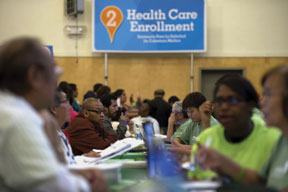
 Blacks gain most from Obamacare when Medicaid expanded
Blacks gain most from Obamacare when Medicaid expanded
By Freddie Allen, NNPA Senior Washington Correspondent
WASHINGTON, DC (NNPA) – As families prepare to choose health insurance coverage during the open enrollment period, a recent report by the Urban Institute shows that Blacks have the most to gain from the Patient Protection and Affordable Care Act (ACA) if the states they live in expand Medicaid under the law.
The Urban Institute, a non-profit research group focused on social and economic policy, estimated that Blacks will experience, “the largest decreases in uninsurance rates under full Medicaid expansion: a drop from 11.3 percent (projected with current expansion decisions) to 7.2 percent” and the uninsurance rate gap between Blacks and whites will fall from 6.5 percent under current Medicaid expansion to 2.6 percent with full expansion.
However, the gap between Black and white un-insurance rates will remain closer to 7 percent, at least for the near future, because most Blacks live in states that have refused to expand Medicaid under the ACA.
The original law, passed in 2010, mandated Medicaid expansion nationwide, but the United States Supreme Court 2012 decision in the National Federation of Independent Business v. Sebelius case reversed that provision, leaving it to the states to decide whether they want to take additional Medicaid funding under the ACA.
According to the Urban Institute, “As of December 2014, 27 states and the District of Columbia had expanded Medicaid or planned to expand by January 2015.”
The Urban Institute projected that Blacks would comprise 12.8 percent of all coverage gains under current Medicaid expansion policies and 2.9 million Blacks would get health insurance. The uninsurance rate for Blacks would fall from 19.6 percent to 11.3 percent.
More than half of all Blacks live in states, primarily in the South and led by Republican governors, that didn’t expand Medicaid after the ACA was passed in 2010.
When states refused to expand Medicaid, the move trapped Blacks in a “coverage gap,” because many of them don’t meet the income-based requirements to qualify for Medicaid under their own state rules or to receive subsidies through the ACA marketplace.
About 1.4 million Blacks fall into this category, accounting for more than 23 percent of the uninsured non-elderly adult Blacks. For example, in Florida, Georgia, Texas and North Carolina, the uninsured rates for Blacks would plummet roughly 30 percent compared to current rates, if those states expanded Medicaid coverage under the ACA.
“For Blacks, however, the difference between their un-insurance rates and whites’ rates is projected to narrow under the ACA with current Medicaid expansion decisions only in Medicaid expansion states,” the report said. “Across all states, the difference in uninsurance rates between Blacks and whites is projected to stay approximately the same both under the ACA with current Medicaid expansion decisions and without the ACA.”
In August 2014, researchers with the Urban Institute said that 6.7 million residents would still remain uninsured in 2016 in the states that continued to block Medicaid expansion through the ACA.
“These states are foregoing $423.6 billion in federal Medicaid funds from 2013 to 2022, which will lessen economic activity and job growth,” the August 2014 report said. “Hospitals in these 24 states are also slated to lose a $167.8 billion (31 percent) boost in Medicaid funding that was originally intended to offset major cuts to their Medicare and Medicaid reimbursement.”
The report continued: “For every $1 a state invests in Medicaid expansion, $13.41 in federal funds will flow into the state.”
The Council of Economic Advisers (CEA), a small group that offers the president domestic and foreign economic advice, predicted that, Medicaid expansion would have added, in nonexpanding states, nearly 79,000 jobs in 2014, “172,400 jobs in 2015, and 98,200 jobs in 2016.”
The August 2014 report also noted that that the rate of un-insured in the states that expanded Medicaid fell by nearly 40 percent, since September 2013, the number of uninsured in the non-expansion states fell by less than 10 percent.
The technical difficulties that plagued the rollout of HealthCare.gov last year have faded from headlines, and the benefits of Medicaid expansion under the Affordable Care Act become harder for governors and state legislators to dismiss.
In December, Republican Tennessee Gov. Bill Haslam moved to expand Medicaid under the ACA, leaving less than two dozen states to weigh providing health care for their poorest residents against future costs associated with Medicaid.
The Urban Institute report on un-insurance rates under the ACA said that improving health literacy, translation services, outreach through ethnic media and working with trusted members of the community can also aid in driving down the levels of uninsured.
According to a recent report by the Department of Health and Human Services (HHS), 87 percent of the people who selected health insurance plans through HealthCare.gov were eligible for financial assistance, a 7 percent increase over last year’s numbers.
“That includes more than 3.4 million people who selected a plan in the 37 states that are using the HealthCare.gov platform for 2015, and more than 600,000 consumers who selected plans in the 14 states that are operating their own Market-place platform for 2015,” stated a press release on the report.
A more detailed view of enrollment data collected from Nov. 15 to Dec. 26, 2014 showed that roughly 6.5 million people either selected plans or were automatically reenrolled.
HHS Secretary Sylvia Burwell said that the vast majority of people who signed up for health insurance coverage through HealthCare.gov were able to lower their costs using tax credits.
“Interest in the Marketplace has been strong during the first month of open enrollment,” Burwell said in a recent press release about the enrollment report. “We still have a ways to go and a lot of work to do before Feb. 15, but this is an encouraging start.”





Be the first to comment